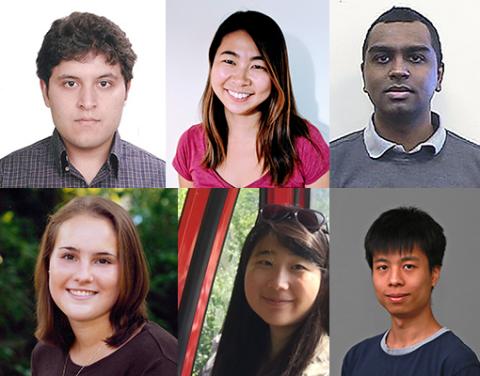
These awards are made possible through support from:
- Robin Chemers Neustein Graduate Research Fund
- Dr. Daniel C. Cooper Graduate Award
- Dr. Achilles Frangistas Fund for Neurodegeneration Research
- Suna Kıraç Fellowship and Research Fund in Molecular Biology
- Charles A. Dana Graduate Fellowship Fund
- Howard Reisman '76 Family Graduate Fellowship Fund
- Edelman Fund
- Macklin Bequest
- Department of Psychiatry and Human Behavior
Ozan Baytas is investigating the molecular mechanisms of intellectual and developmental disabilities. He is a PhD candidate in the Neuroscience Graduate Program, working in the laboratory of Eric Morrow. He completed a BSc in Molecular Biology and Genetics at Bogazici University in Istanbul, Turkey, where he graduated at the top of his class. Mr. Baytas’ research project will clarify the role of the enzyme GPT2 in mitochondrial metabolism in brain development and neurodegeneration. He is the second author on an article in the Proceedings of the National Academy of Sciences that described a new neurological disorder caused by loss-of-function mutations in the gene encoding for GTP2 in humans, and he is now studying the mouse model of the disorder. Mr. Baytas intends to become an independent academic in a university setting, and to foster collaborative and interdisciplinary research. This award is supported by the Suna Kıraç Fellowship and Research Fund in Molecular Biology.
Sun Maybury-Lewis studies the molecular mechanisms of brain aging. She is a PhD student in the laboratory of Ashley Webb in the Department of Molecular Biology, Cell Biology and Biochemistry. After completing a BSc in Biology from Boston College, Ms. Maybury-Lewis gained extensive research experience spending four years at the Center for Human Genetic Research at the Massachusetts General Hospital. She is investigating the changes in chromatin organization and epigenetic markers of neural stem cells as they become active in the brain, and how such changes are altered in the aging brain. Ms. Maybury-Lewis long term plans are to become a faculty member at a university conducting independent research in molecular biology and bioinformatics. This award is supported by the Robin Chemers Neustein Graduate Research Fund.
Prannath Moolchand is studying how the signals in the subthalamic nucleus change under response conflict conditions. The subthalamic nucleus supports decision making by inhibiting the expression of behavior, thus providing the cognitive system time to resolve conflicts and implement appropriate actions. Combining biophysical and systems level modeling from the laboratories of Professors Stephanie Jones and Michael Frank, he studies the cellular and network behaviors in the subthalamopallidal network to understand the signal modulations. Mr. Moolchand has a Bachelor’s degree in Mechatronics from the University of Mauritius and a Master’s degree in Cognitive and Computational Neuroscience from the University of Sheffield in the United Kingdom. He joined Brown University as a Fulbright Foreign Student and is enrolled in the Open Graduate Education Program to obtain both a PhD in Neuroscience and a Master’s degree in Applied Mathematics. Mr. Moolchand is interested in mathematically grounded Theoretical Neuroscience and intends to pursue an academic career. One of his ultimate aims is to take his skill set back to his home country of Mauritius to help foster neuroscience research. This award is supported by the Dr. Daniel C. Cooper Graduate Award, the Charles A. Dana Graduate Fellowship Fund, and the Department of Psychiatry and Human Behavior.
Veronica Ryan studies the role of protein localization in the function of neurons and in neurodegeneration. She is a PhD student in the Neuroscience Graduate Program co-mentored by Nicolas Fawzi and Anne Hart. She received a BS in Biochemistry from the University of Notre Dame before joining Brown University. Her research project uses in vitroand in vivo approaches to reveal the molecular details of the assembly of hnRNPA2 transport granules and how they are regulated by posttranslational modification. The two-pronged approach is essential for a comprehensive mechanistic understanding of how disruption of critical protein-protein interactions leads to neurodegeneration. Ms. Ryan plans to continue studying neurodegenerative diseases, and to obtain a research and teaching position at an academic institution. This award is supported by the Charles A. Dana Graduate Fellowship Fund, the Macklin Bequest, and the Dr. Achilles Frangistas Fund for Neurodegeneration Research.
Hyeyoung Shin combines mathematical modeling, advanced electrophysiological and optogenetic methods and highly controlled behavior in mice to better understand sensory perception. She is a PhD candidate in the Neuroscience Graduate Program working with Chris Moore and Stephanie Jones. She graduated with high honors with a Bachelor of Engineering, Bioengineering and Biotechnology from Yonsei University in South Korea. Ms. Shin aspires to lead her own laboratory at a research university, living at the cutting edge of experimental techniques and computational modeling. She will continue her efforts towards seamless synthesis of the generative loop between experimentation and data-constrained computational modeling. This award is supported by the Dr. Daniel C. Cooper Graduate Award and the Edelman Fund.
David Xing is pursuing research devoted to developing a cortical-spinal neuroprosthesis for motor rehabilitation in lower limbs. Mr. Xing has a BS in Biomedical Engineering from Columbia University, coming to Brown with a strong background in applied mathematics, neural signal analysis, and neural interface evaluation. He is a PhD student in the School of Engineering under the mentorship of David Borton. Mr. Xing is currently focused on performing closed-loop decoding of neural signals for lower-limb movement in non-human primates. His long-term goal is to expand his work for applicability in humans whether in industry or academia, focusing on performing basic neuroscience research on neural representations of motor control during locomotion and using the knowledge to inform the development of novel prosthetic devices. This award is supported by the Howard Reisman '76 Family Graduate Fellowship Fund and the Charles A. Dana Graduate Fellowship Fund.